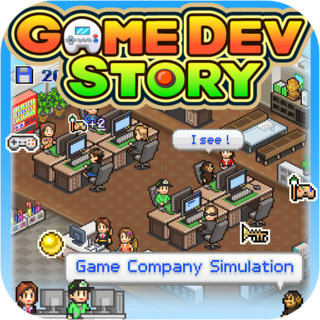Game Dev Story let's us start our own game company. Highly addictive and deep for such a little game.
The Bad: Starting out can be tough, graphics a little too simple, not optimized for HD phones
It really is games like Game Dev Story that truly prove graphics, sound, and pizzazz aren't everything because GDS is just highly addictive, tongue in cheek, and very entertaining. What makes a game developing simulator fun? Developing games isn't really fun to begin with so the game should be as fun as eating stale bread. Kairosoft are geniuses and there's a lot to be had here.
You start out with a little bit of cash, 4 employees, and only being able to develop on PC. You hire employees by paying for different job ads. The higher the job ad price the better skilled people will come into your office. Once you get your 4 people you pick a game system (new systems are released regularly but cost tons of money to buy licenses for). The game really tries to emulate the game industry by putting out consoles by three different companies Intendro, Sonny, and Micro. The game goes by in weeks, months, and years so certain events trigger at different times.
Once you pick your genre (rated by popularity from A-C) then you pick the type of game. Make sure the two match otherwise you will get poor sales. Once you pick the two (you can unlock more by training employees or hiring very skilled ones) you have to choose someone to design the game. Each employee has four types of ratings ranging from Program, Scenario, Graphics, and Sound. Scenario is what you want for people designing the game to start with. Once you choose this they will start pumping icons into a few of the four categories to make your game good: Fun, Creativity, Graphics, and Sound. When you start out your games won't be very good, but after a few years they will be.
Once this is all done and depending on the type of quality you chose for your game (the higher the quality the more money it costs) Your percentage complete ticker will start climbing. Depending on how skilled your developers are your four areas will increase. When the game is 40% done you will be asked to choose someone to boost the graphics. You can use the people you have or hire someone else to do it and this can cost lots of money if you choose someone with a high graphics rating. When the game is 80% done you will be asked to boost the sound and the same applies. Once the game is done you will start the debugging process and this can add lots of research data (use this to level up employees) and doesn't really impact you negatively if you have a lot of bugs.
After the game is done you will be asked to name it then ship it and then critics will rate your game. When you start out the game will score low and probably won't start getting high reviews until your 10th year or so. If you get a score of 31 or higher it goes into the hall of fame and you can develop sequels. Once the game ships your first week sales will come in and depending on its chart placing you will get good sales or not. After awhile the sales drop off and then its off the market, then you repeat the process. Keep on top of the most popular console to boost sales as well as choosing good advertising methods because you need to keep your popularity up with every age demographic. Every 5 years the numbers will move down and you will lose fans if you don't keep up.
When you start leveling up employees, the games get better and sales go up with high areas in-game design. During points of the year you will get to go to Gamedex and accumulate fans to boosts sales as well as the awards show at the end of the year to earn extra prize money. After awhile you will start earning millions of dollars and be able to hire more people and move into bigger offices. Eventually you can fire people with low skills and start moving higher skilled people in and then your scores start going to 9's and 10's.
The beauty of the game is the climb to a successful company and your ability to do checks and balances determines if you fail or not. Starting out is a struggle, but it's just so addictive and feels true to the game industry. The game may not be much to look at with simulated 8-bit graphics and sound, but I just played this for hours and hours and couldn't put it down because you keep developing one more game and trying to balance your company out to make big bucks, get the latest systems, the most fans, hype up your games, and try to win game of the year. If you love simple simulations like these you will love Game Dev Story because there's nothing quite like it.

